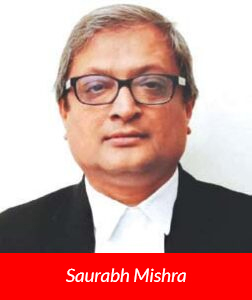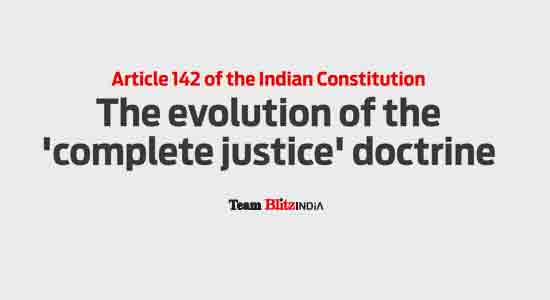 The Indian Constitution, a dynamic and living document, has been subjected to myriad interpretations to address the evolving needs of the nation. A prominent example is Article 142, which authorises the Supreme Court to “pass such decree or make such order as is necessary for doing complete justice in any cause or matter pending before it.” This power is both exceptional and extraordinary, enabling the Supreme Court to transcend the bounds of statute law to ensure justice. This article delves into the evolution, interpretation, and application of Article 142, examining various landmark case laws and drawing comparative insights from other jurisdictions.
The Indian Constitution, a dynamic and living document, has been subjected to myriad interpretations to address the evolving needs of the nation. A prominent example is Article 142, which authorises the Supreme Court to “pass such decree or make such order as is necessary for doing complete justice in any cause or matter pending before it.” This power is both exceptional and extraordinary, enabling the Supreme Court to transcend the bounds of statute law to ensure justice. This article delves into the evolution, interpretation, and application of Article 142, examining various landmark case laws and drawing comparative insights from other jurisdictions.
Understanding Article 142
The Supreme Court of India has unprecedented power to issue any decree or decision necessary to ensure that all pending cases are resolved fairly and impartially thanks to Article 142 of the Indian Constitution. This all-encompassing phrase includes not only procedural and substantive justice, but also remedial justice. Importantly, any such decree or order pronounced by the Court is legally binding and enforceable in all of India in compliance with the procedures established by law.
Article 142 is a testament to the court’s role as the guardian of the rights of the citizens and the custodian of the Constitution. The Constituent Assembly recognised its pivotal role during the drafting of the Constitution, appreciating its capacity to protect individuals who suffered unjustly due to the inherent limitations of the legal system. However, it is a power to be exercised sparingly, with self-imposed restraint, given its potential to disrupt the delicate balance of power among the legislature, executive, and judiciary.
Cases interpreting Art 142 Delhi Judicial Service Association vs State of Gujarat, 1991: The Supreme Court invoked Article 142 to transfer a case from a court in Gujarat to itself to ensure a fair trial, setting a precedent for the court’s power to transfer cases to ensure justice.
Union Carbide Corporation vs Union of India, 1991: In the infamous Bhopal Gas Tragedy case, the Supreme Court used Article 142 to approve a settlement between the parties, which was later criticized for ignoring the rights of the victims. However, the Court clarified that it had acted to provide immediate relief to the victims.
Supreme Court Bar Association vs Union of India, 1998: This case put a check on the unfettered use of Article 142. The court ruled that the power under Article 142 cannot be used to contravene any “express statutory provision.”
Evolution of Article 142
Over the years, the interpretation of Article 142 has evolved, with the judiciary broadening its ambit to ensure justice. Initially, the use of Article 142 was limited, primarily dealing with procedural issues. However, as cases grew more complex and demands for justice increased, the Supreme Court began to use this article more frequently and expansively. The court has established through precedents that the authority of Article 142 complements the existing legal framework and should not be used as a substitute for the law or established procedures.
In a case involving a divorce that was brought before the Supreme Court in 2023, the applicability of Article 142 was subjected to a thorough examination and was elaborated upon. The Supreme Court of India established beyond a reasonable doubt that the idea of “equitable power” as outlined in Article 142 of the Indian Constitution strikes a precarious balance between overarching and more particular norms. The concept of equity can be broken down into two primary subcategories: (i) general equity, which entails a benevolent and compassionate interpretation of the law without contradicting it, and (ii) particular equity, which entails a benevolent and empathetic modification of the law in extraordinary circumstances that are not governed by the general rule.
Significant implications
Looking to the future, the evolving interpretation of Article 142 could have significant implications. It could alter the balance of power between the judiciary and other branches of Government, raising questions about judicial overreach. This evolving jurisprudence of Article 142 will continue to shape the legal landscape, affecting a range of issues from individual rights to the functioning of democracy.
Article 142 embodies the flexibility and adaptability of the Indian Constitution, enabling the Supreme Court to meet the evolving demands of justice. Its application must be tempered with restraint to uphold the principle of separation of powers. While the Court has the power to ensure complete justice, it must respect the roles of the legislature and the executive.
Conclusion
The journey of Article 142 is a testament to the dynamic nature of our Constitution and the judiciary’s commitment to securing justice for all. As we move forward, it is crucial to ensure that the interpretation and application of Article 142 continue to reflect changing societal values and the demands of justice, while upholding the principles of our democratic system.
As we ponder the future of Article 142, we invite our readers to reflect upon its implications. How can we ensure that this power is used judiciously? What safeguards can be put in place to maintain the balance of power between the branches of Government? It is essential that we, as informed citizens, engage in these discussions and contribute to the discourse around the evolving interpretation and application of Article 142. Ultimately, our engagement with Article 142 is a journey towards a more just and equitable society, demonstrating the enduring strength and flexibility of the Indian Constitution.
Let us participate in this journey, contributing to the dialogue, and shaping the future of this powerful legal tool. Together, we can strive to uphold the spirit of justice that underlies the Constitution, ensuring that Article 142 remains a beacon of hope and a testament to the resilience of our democratic system.
















